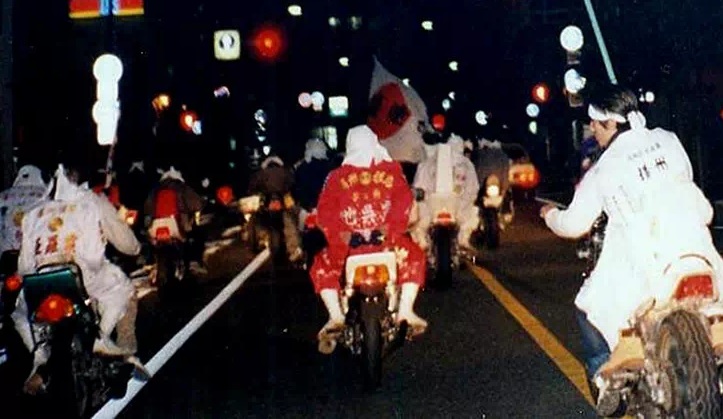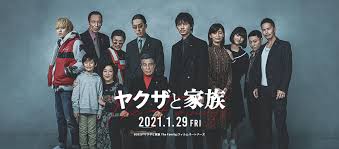About Yakuza, Japanese Mafia, Organized Crime Syndicates in Japan
CONTENTS
- Yakaza on the verge of extinction
- Current situation of yakuza in Japan
- How do the yakuza make a living? What is the source of income?
- Organizational structure of the yakuza
- How to become a member of the yakuza organized crime syndicates
- Why do they become a yakuza?
- Historical Background of Yakuza
- Recent Crackdowns
- As a foreigner living in Japan
Yakaza on the verge of extinction
by Ryoji Shimada, staff writer
There are two yakuza movies "Yakuza to Kazoku" (Yakuza and its Family) and "Subarashiki Sekai" (Splendid World) that have been shown this year. They are both highly rated and seen by many people, but they all have one thing in common that the life of a yakuza has become increasingly difficult in Japan. Personally, I think they are very good movies, but it raises some issues that make me think.
What is the situation of the yakuza now? They are known as the Japanese mafia, and they are well known not only in Japan but also overseas to some extent. If you are just coming to Japan for sightseeing, you don't need to worry about them, but if you are a foreigner living or working in Japan, you should have some knowledge about the yakuza. So let me explain a little about the current situation of the yakuza.
Current situation of yakuza in Japan
According to an announcement by the National Police Agency on April 2, 2020, the number of yakuza forces nationwide at the end of 2019 was 28,200 (down 2,300 7.5% from the previous year), the 15th consecutive year of decline. The number of related gang members is about 14,400 (down 1,200 from the previous year), and the number of quasi-constituents and others who do not belong to gangs but are involved in gang activities decreased by 13,800 (down 1,100 from the previous year), a significant decrease from the peak of 184,100 in 1963.
How do the yakuza make a living? What is the source of income?
What do the yakuza do to earn money? At one time, it was said that the yakuza earned as much as 6 trillion yen a year in profits. Although the scale of the yakuza is probably much smaller now, they still use all kinds of illegal means to make money. Typical examples include drug and methamphetamine trafficking, extortion, blackmail, racketeering, bank transfer scams, fleecing, robbery, shoplifting, smuggling, murder, extortion, shoplifting, theft, kidnapping, black market finance, controlled prostitution, beauty pageants, and other criminal activities. Even businesses that seem legitimate at first glance may have yakuza working behind the scenes. In the past, this was often seen in the real estate industry. Even today, food stalls at festivals are an important source of income for gangsters or the yakuza.
Organizational structure of the yakuza
The Japanese yakuza is usually characterized by the establishment of hierarchical and pseudo-kinship relationships that mimic the patriarchal system in which the younger brothers, minions and henchmen are absolutely subordinate to the head of the yakuza group, and this relationship ensures a strong bond between them. In general, the gang leader, who is the representative of the gang, and the members, who are the members of the gang, are bound by a strong bond through a ceremony called "sake drinking exchange." The members of the gang are roughly divided into two groups: younger brothers (shatei) and henchmen (wakachu, wakashu, etc.). The wakachu or wakashu can form the secondary organization and become the leader's position. In this case, the first organization is called the primary organization.
By repeating this process, gangs form a pyramidal hierarchical structure. For example, the Yamaguchi-gumi, the most famous gang in Japan, has been confirmed to have up to five subordinate groups. Although the gangs claim that the members of the subordinate organizations are "those who have no relationship with the upper organizations," they are viewed by the outside world as "those who are under the control of the upper organizations and under the direction and supervision of the leader of the upper organizations.
How to become a member of the yakuza organized crime syndicates
Although the circumstances of becoming a member of yakuza group differ from person to person, it is often through an introduction or invitation from a close friend who is a member of the group. There are also cases where a person is recruited by a close friend in a juvenile reformatory or prison, or a person who belongs to a group that has a high affinity with gangs and has a hierarchical relationship with them, such as the relationship between senior and junior members of a motorcycle gang, and graduates from the group to become a yakuza.

Bosozoku, young road worriers
The gang members pay a certain amount of membership fee in return for being protected by the organization (e.g., for dealing with troubles, providing flexible manpower, etc.) and in exchange for being allowed to use the group crest (e.g., for using the name of the organization in fundraising activities). This is called a "top-up fee." When the Yamaguchi-gumi split occurred in 2015, it became a hot topic of discussion that the leader of a subordinate organization was required to pay more than one million yen per month. The document found in the same period shows that a senior member must pay 400,000 - 500,000 yen per month, a young leader of a secondary organization 250,000 yen per month, and a rank-and-file member less than 10,000 yen per month. In addition, congratulation and condolence money (those are not taxed, so it is used as a taxation measure) is collected separately. In addition, each organization has its own "front companies" (companies run by gang members or quasi-gang members in order to obtain funds) and advisory companies, and the profits from these companies are paid to the upper organization as a top payment. In recent years, they have been forced to purchase expensive newsletters and various commodities handled by those front companies affiliated with the upper organization, and the repeated coercion of payments has become a factor of conflict and division within the yakuza organization.
On the other hand the bosses (yakuza head in the first tier group) of large organizations do not need to make illegal money on their own, but use the money to fund the organization's operations and activities, as well as to live a luxurious life by building mansions, keeping mistresses, and driving luxury cars.
Why do they become a yakuza?
Many people who join gangs do so out of necessity. In other words, they are people who have been socially discriminated against growing up, or people of Korean nationality or descent. These facts are not often reported in the media. However, there are credible testimonies from the police, public safety officials or "Koan," and yakuza themselves about these facts.
David Kaplan and Alec Dubro have co-authored a book entitled "Yakuza Nippon Style Criminal Underground and Right Wing" (Daisan Shokan. The original title is Yakuza: The Explosive Account of Japan's Criminal Underworld) states, "Unofficially, the police say that about 70% of the 25,000 members of Japan's largest widespread gang, the Yamaguchi-gumi, are from "Buraku," (lowest in the social stratification and often discriminated) and about 10% are from South Korea and other foreign countries. The police believe that about 70% of the 20,000 members of the Yamaguchi-gumi, Japan's largest gang, are from the Buraku community and about 10% are foreigners such as Koreans.
In "Glico-Morinaga Incident: The Most Important Witness M," co-authored by Manabu Miyazaki and Akihiro Otani, the authors wrote, "I think minorities are definitely involved. This is the peculiarity of incidents in Kansai region. For example, if there is a yakuza organization with 1,000 members, up to 900 of them are minorities, the lowest in the social stratification."
In a speech to the Foreign Correspondents' Club of Tokyo on October 19, 2006, Mitsuhiro Suganuma, a former public security investigator, stated that he had heard from Seiji Takayama, the Yamaguchi-gumi's number two, that the breakdown of the gang's origins was 60% "Buraku," 30% Korean residents in Japan, and 10% Japanese. Yukio Yamanouchi, who served as a lawyer for the Yamaguchi-gumi, wrote in his "Memoirs of a lawyer for the Yamaguchi-gumi" in the November 1984 issue of Bungeishunju, " It is a fact that there are many Koreans living in Japan and people from the lower social stratification district among the yakuza. The fact that there are about 650,000 Koreans (currently about 450,000), of which about 50% are concentrated in Hyogo, Osaka and Kyoto, is by no means unrelated to the development of the Yamaguchi-gumi, and the Yamaguchi-gumi cannot be discussed without mentioning the problems of discrimination against Buraku and Koreans.
In the case of pachinko, which is not illegal but has a very strong image of gambling, Koreans in Japan and Japan-Korea hold a large influence. For example, Maruhan, one of the largest pachinko parlors in Japan, boasts annual sales of 1.5 trillion yen and was founded by Koreans living in Japan. The company has more than 12,000 employees. Recently, however, the pachinko industry has been hit hard by the recession and sales have fallen to almost half of what they were in its heyday.
Historical Background of Yakuza
Originally, the name "gangster" was given by the police, but after World War II, the name came to be recognized by the general public through the mass media.
There is a theory that it originated in the Edo period (1603-1867) when firefighters in the town were known as "tekiya" for those who engaged in commercial activities in the vicinity of festivals, and "bakuto" for those who engaged in gambling for a living. In the Edo period, these people were considered to be low-class people (synonymous with outlaws) outside of the general society.
In the Meiji era (1868-1912), physical labor unions were newly added to the labor force, and with the rapid development of the country of Japan and the need for a huge labor force, strong men from farming and fishing villages gathered at coal mines, water transportation, ports, and large-scale construction sites. From among these men, the strongest men became the main leaders and formed "gangs". Since the police did not have enough resources, gangs with a vigilante-like role began to be formed.
Immediately after the end of the Pacific War, Japan was defeated by the Allies and the country was reduced to a scorched earth, resulting in a shortage of goods and the flourishing of black markets. In addition, postwar Japan's security was extremely poor due to the social devastation caused by the defeat in the war. In the midst of this, gangs sometimes emerged from the new delinquent groups that had formed in the postwar chaos.
The police also began to take action against the rapidly growing gangs, making mass arrests (described as yakuza hunting) of about 5,000 people in April 1950 and about 200 people in July of the same year in the area under the jurisdiction of the Metropolitan Police Department alone. But it was just a tip of the iceberg.
Later, with Japan's rapid economic recovery, "front companies" were created that were only engaged in legitimate economic activities such as offshore brokerage and entertainment performances. But most of them engage in a variety of illegal activities. In the past up until the end of the 20th century, Japanese gangs or yakuza tended to operate openly, making backroom deals with the police and gaining public exposure.
In addition, there was a period (1986-1991) when the power of the gangs increased due to the bubble economy, and the gangs during that period become "jiageya" (contractors who buy and sell land using forceful methods, such as forcing eviction by violent means) against the backdrop of rising land prices across the country. The criminal activities led to the emergence of young gangster executives who obtained money in the hundreds of millions.
Recent Crackdowns
When prefectural and municipal governments enacted ordinances to exclude organized crime syndicates or groups in the 2000s, in line with the purpose of the ordinances, various businesses were required to confirm orally or in writing with the other party to the contract whether or not they were affiliated with an organized crime group. If they identify themselves as a gangster, they may be refused the contract, or arrested for blackmail. If you falsely state that you are not a member of a crime syndicate or yakuza, your contract will be cancelled or you will be arrested for fraud. For this reason, since the establishment of the Gangster Exclusion Ordinance, gangsters or yakuza are no longer allowed to receive public services (such as moving into or living with public housing, receiving public assistance, child support allowance, etc.). In addition to this, they are unable to have credit cards, open bank accounts (maintain existing accounts), purchase or lease real estate, purchase cars, stay at hotels, purchase cell phones, play golf, etc.
In many cases, even if a member quits the gang, the regulation will continue for several years, during which time the former member will not be able to work, and there are members who cannot quit even if they want to for that reason. Although there are moves to provide support to those members who intend to quit and to set up support systems, many ordinary people view the former members who are getting what they deserve.
The number of former yakuza members who left the gang with support from the police and other organizations was about 6,120 between 2006 and 2015. On the other hand, only 147 people, or about 2%, were able to find employment after receiving support. There are many cases of people who return to the gang because they cannot break ties with their old relations or have money problems while unemployed. Furthermore, there are those who quit the gang but reenter the world of crime by committing fraudulent crimes.
As a foreigner living in Japan
The two Japanese yakuza movies released this year also depict the difficulties of living as a yakuza in Japan. The society discriminates against them in various ways including discrimination in employment. It is also said that in recent years, the gangs do not register newcomers and subordinate members as members of the gang, but allow them to work as members of the affiliated "Han-Gure" group. This group is also depicted in one of the two movies, "Yakuza to Kazoku."
In addition, there have been many incidents where celebrities who have been associated with the yakuza have been found out and have lost their careers. One of Japan's top celebrities, Shimada Shinsuke, retired after his association with the yakuza was exposed. Also, some comedians who worked at a party hosted by the yakuza became a big problem and lost their jobs for a long period. Not only gang members, but also ordinary people who have relationships with the yakuza become targets of social criticism. As a result, yakuza have become increasingly difficult to live in Japanese society.
Some people may misunderstand the yakuza as a world in the movies, but they do exist in the real world. However, the number of yakuza is decreasing compared to the past, and it is a fact that their presence is becoming less and less visible. However, when I go to public baths, I often see people with tattoos. This is the proof that yakuza are still around in our society. Of course, there are people who used to be yakuza and are now living not as yakuza. But on the other hand, there are also yakuza who do not have tattoos. In other words, there are yakuza who are hiding in the world and earning money by doing illegal work. Of course, it may not be illegal, but there may be cases where foreigners are forced to work like slaves for less than the minimum wage in fishing or farming industries. I think it is very important to be aware of the fact that there are such people even in Japan, which seems to be a peaceful country.
On the other hand, the antithesis of these two films is that the real world (outside of yakuza society) is a much dirtier place than the world of the yakuza. The yakuza are reasonable people, but they put themselves in the yakuza world to survive, and the social sanctions are too severe. Bullying at school, jealousy at work and pulling each other down, slander on social networking sites without resorting to violence... is really such a wonderful world? Isn't the world of yakuza much more just, righteous, humane, manly, and reasonable? The antithesis of the movie was very thought provoking.





One thought on “About Yakuza, Japanese Mafia, Organized Crime Syndicates in Japan”